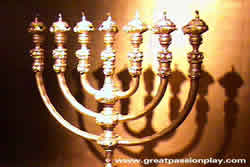Days 45- 46, Chronological Bible Study Timeline. Map. Go to today's Bible reading (use your browser arrow to return): Exodus 36:8–40:38
Note: The calendar dates in today’s study are combined because of the continuing theme. You may wish to do the Bible reading on the 14th then read this Bible study on the 15th.Getting It Right (following the design)
If you are reading this Bible study following the calendar, Happy Valentine’s Day! God’s design for the tabernacle can give us relationship principles to use if we’re married. These will be at the end of this Bible study, so we don’t take away from the intended meaning of the text.
Suppose we have a project and want to begin construction. We have the plan, materials, labor, and resources to start. How do we make sure we do the project right? We can ensure the quality by having motivated workers, skilled workers, and by inspecting the work, making sure it fulfills the specifications and the purpose we intend for it. This we should do whether it is for spiritual or secular purposes, and we should keep records. If we do, we can praise God for what he has done. Let's go through each of these important factors to get the project done right and pleasing to God.
Have motivated workers
There is nothing more discouraging to contractors or supervisors than unmotivated laborers. They may arrive late and leave early or just stand around and waste time. They don’t care about the project or its quality.
As we have seen in recent Bible studies, God’s plan for the tabernacle is for a portable worship center for Israel. It will remain their worship center until they enter the Promised Land, the land of Canaan. Volunteers gather the tabernacle materials and give generously. Volunteers also build the portable structure. Forced labor doesn’t exist like they experienced in Egypt.
Skilled workers are essential
We need skilled labor to complete a project with quality and precise specifications. This was also true with the construction of the tabernacle.
Moses says to the Israelites,
See, the LORD has chosen Bezalel son of Uri, the son of Hur, of the tribe of Judah, and he has filled him with the Spirit of God, with skill, ability and knowledge in all kinds of crafts—to make artistic designs for work in gold, silver and bronze, to cut and set stones, to work in wood and to engage in all kinds of artistic craftsmanship.
And he has given both him and Oholiab son of Ahisamach, of the tribe of Dan, the ability to teach others. He has filled them with skill to do all kinds of work as craftsmen, designers, embroiderers in blue, purple and scarlet yarn and fine linen, and weavers—all of them master craftsmen and designers (Exodus 35:30-35, NIV).
Today, God has gifted us, followers of Christ, with talents and abilities (Romans 12:6-8; 1 Corinthians 12:1-3; Ephesians 4:7-16). He wants us to use them for his glory. We’re not all gifted in the same way. Because of this, some might say, “I don’t have that gift, so I can’t do it.” But are we willing to be trained for a needed task or ministry so we can encourage and build up the entire church?
Another key factor in getting the project done right is to
Inspect the work
When you looked at today’s Bible reading, you might think, we just read this a couple of days ago. Why is this repeated? That’s right; Chapters 36-39 are almost an exact repetition of chapters 25-31. Then, in Exodus 39:43, Moses records, he inspected everything made for the tabernacle. The point is, these workers constructed the tabernacle precisely as God’s plans dictated to Moses on Mt. Sinai. In chapter 40, there is a constant refrain that Moses made everything related to the tabernacle and all its furnishings exactly as the LORD commanded.
If we think about it, this is a convicting thought: do we do exactly what God commands us to do? When we read in the Bible his plans for our lives and spiritually building our churches, do we closely or loosely follow them? How is that turning out for us?
Another important way to get a project done right is to
Keep the purpose forefront
Why was the tabernacle made precisely as the LORD told Moses, without modifications? The writer of the book of Hebrews says the sanctuary was
A copy and shadow of what is in heaven. This is why Moses was warned when he was about to build the tabernacle: “See to it that you make everything according to the pattern shown you on the mountain.” (Hebrews 8:5, NIV)
The spiritual significance of the articles
Each article of the tabernacle has spiritual significance for us.
- The Ark of the Covenant, with the angels looking down upon the Mercy Seat, pictures the glorious but invisible presence of God.
- The lampstand represents Jesus, the light of the world (John 8:12).
- The table of showbread, with the two piles of six unleavened (yeastless) flat cakes on it, represents fellowship between God and the twelve tribes of Israel. Jesus is the bread of life. If we, not only Jews but also Gentiles (non-Jews), spiritually partake of him (believing in his work on the cross for our salvation), we can have fellowship with God and each other (1John 1:3; (Ephesians 2:11-18.)
- The altar of incense represents prayer (Luke 1:11-13; Revelation 5:8). Entrance into the presence of God was once inaccessible, except by the high priest once a year. But with the blood of Jesus Christ, God’s Son, he, as our high priest, can bring us into the presence of God (Hebrews 9:7-15).
- At the entrance of the courtyard, the bronze altar of sacrifice represents the sacrifice necessary for sins. There the priests would soon offer constant animal sacrifices. About 1400 years later, when the religious leaders, the Jews, and soldiers crucify Christ on the cross at Calvary, he sacrifices himself so we might have forgiveness once for all. When we accept Christ’s sacrifice for our sins, he forgives all our offenses (Hebrews 9:14-15).
- The priests would use the bronze basin to wash. They were required to do this before ministering with the tabernacle articles and their furnishings. Like the priests, we, too, need daily cleansing of our sins so we may lead holy lives and handle the sacred things of God (i.e., our spiritual ministry). (1John 1:9)
Why keep records?
The tabernacle is a treasure of ornate beauty and wealth and Moses records all the precious metals, stones, and luxurious fabric used in the construction. Why? It shows they serve a worthy God, and he is holy, magnificent, and worthy of our praise!
Some of the precious metals used are gold, silver, and bronze. The workers used one ton of gold for the tabernacle proper and its furnishings, where the priests minister. Then, God orders a census of all the 603,000 male Israelites to maintain the tabernacle. God assesses each male a value in silver, and they collect three and three-quarter tons of silver. (Exodus 30:12; 38:25). They use one and one-half tons of bronze for the altar and its articles used in sacrifice, the bronze basin, courtyard frames, bases, and tent pegs.
Application
What do the materials of the tabernacle have to do with us? The Apostle Peter says God has something much more valuable than precious stones.
For you know that it was not with perishable things such as silver or gold that you were redeemed from the empty way of life handed down to you from your forefathers, but with the precious blood of Christ, a lamb without blemish or defect. (1Peter 1:18-19, NIV)
Christ is more precious than the expensive metals of the tabernacle! Have we accepted him and his sacrifice as payment for our sins? This is the only way God forgives us and allows us to enter heaven, where he dwells.
When they finish the tabernacle and adorn the priests, everything is set up and anointed for service. Moses makes sure they did everything as the LORD directed. Then God’s presence descends as a cloud, and his glory fills the tabernacle. He is pleased!
Whenever the cloud lifts and moves from the tabernacle, the Israelites travel. Whenever it settles over the tabernacle, for however long, they stay put. Are we sensitive to God’s leading? In everything, let’s try to get it right, so we're going with God. Go with God, and He goes with you.
Discussion
How do we ensure quality in our work or ministry?
Why was the tabernacle built to exact specifications, precisely as God directed Moses?
What are the significances of the different tabernacle articles?
What do the precious metals and stones of the tabernacle have to do with us?
Focus Verse
Matthew 5:48 (NIV) “Be perfect, therefore, as your heavenly Father is perfect.”
Principles for Building Relationships
- We must work on the relationship.
- In our love, we should be generous.
- We can’t force love; there must be willingness and motivation.
- We build good relationships by giving out all.
- When needed, it’s good to get counsel from a mature Christian person regarding our relationship. Still, sometimes we need professional help to get it right.
- Let’s follow the blueprint of God’s Word in our relationship. Is it pleasing to God? Are we honoring him in the way we relate to each other? (Malachi 2:13-16; Ephesians 5:21-33 1Peter 3:1-12).
- Love, trust, and obedience are necessary ingredients to building relationships.
- When we mess up, confessing our faults and asking for forgiveness are necessary materials to rebuild and maintain our relationships (more about this in our next lesson).
Write a private prayer response to today’s Bible study:
Please send your comments to me, Rod, the Author
Looking Ahead: After the workers build the tabernacle, the priests are clothed in special garments, and both are anointed (dedicated) for service. Offerings to God then need to be made, but how are they to do it? God instructs Moses to write Leviticus as a manual for instructing the Israelites, and the emphasis is on the holiness of God. In our next lesson, we explain the procedures for the offerings and how they relate in principle with Our Offerings to God. Join us and be enriched!
Back to top of page
Return to Chronological Bible Studies main page
Go to Scriptures main page
Go to Topics main page
re-edited 2-14-23
COPYRIGHT @ 2019, Chronological Bible Studies




